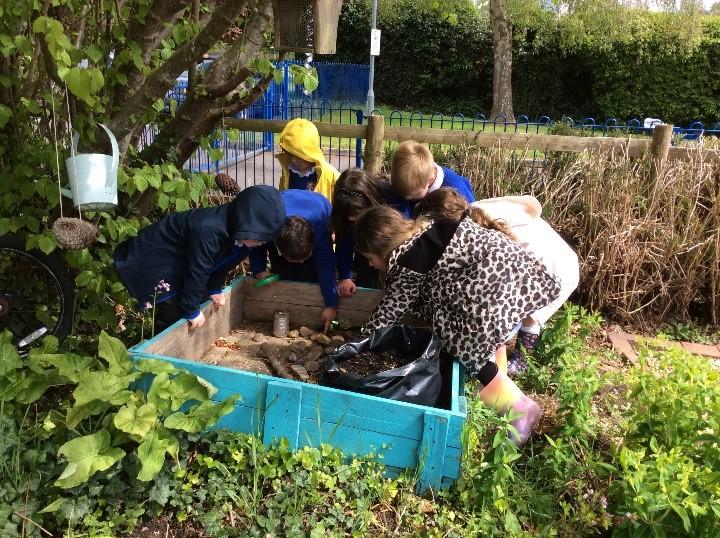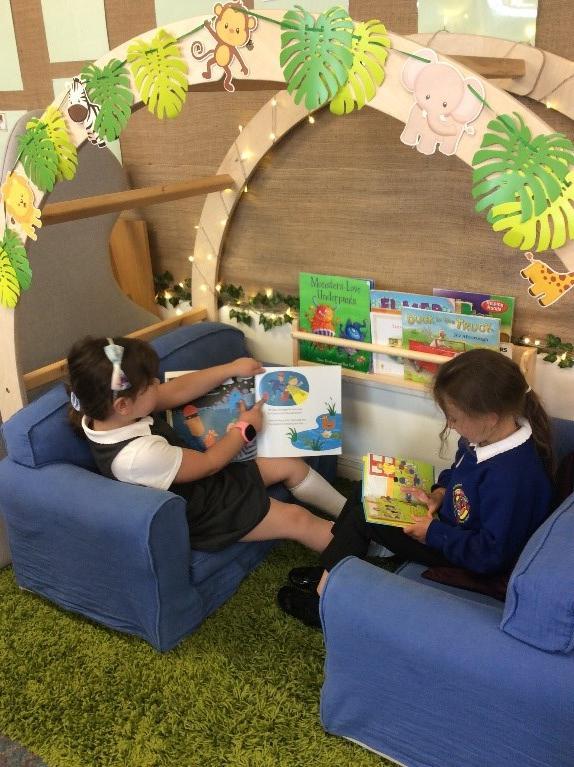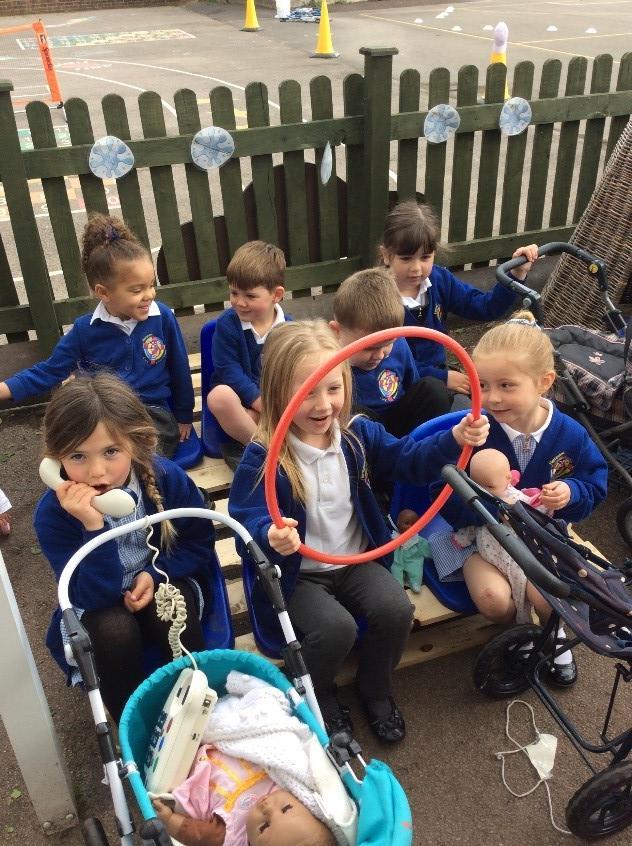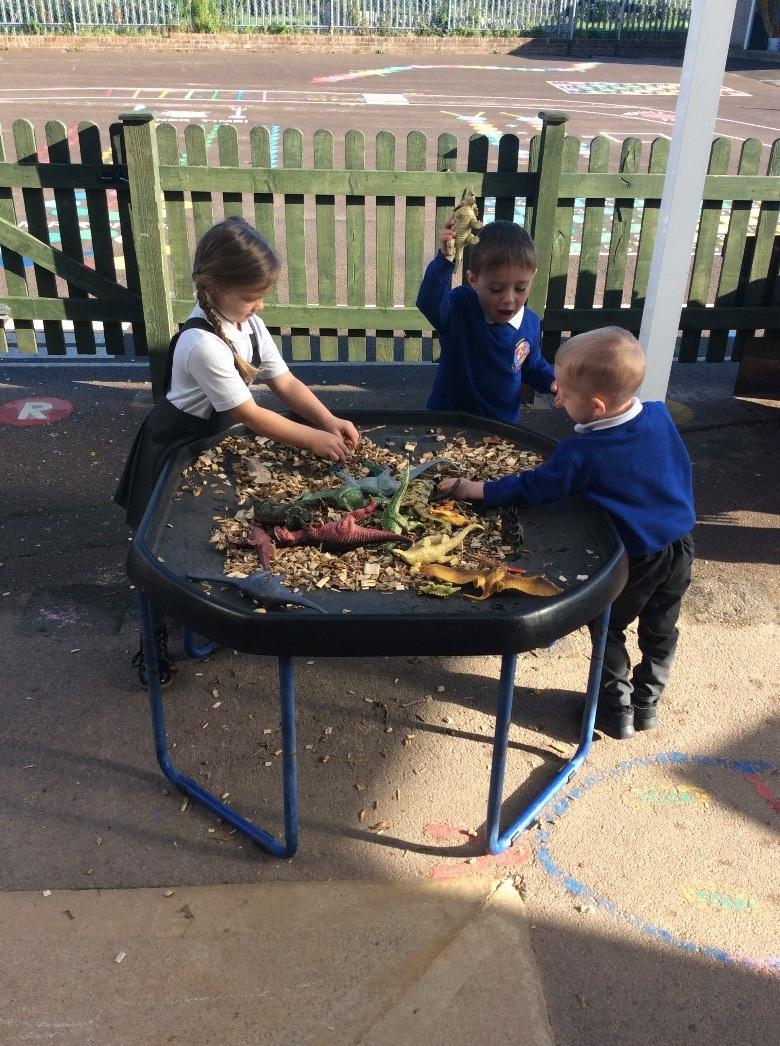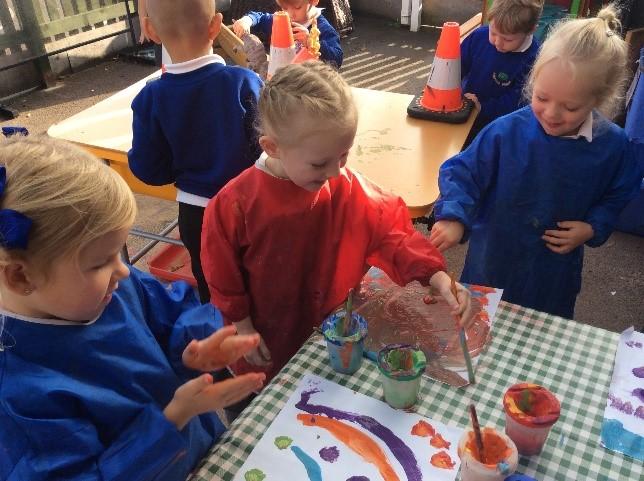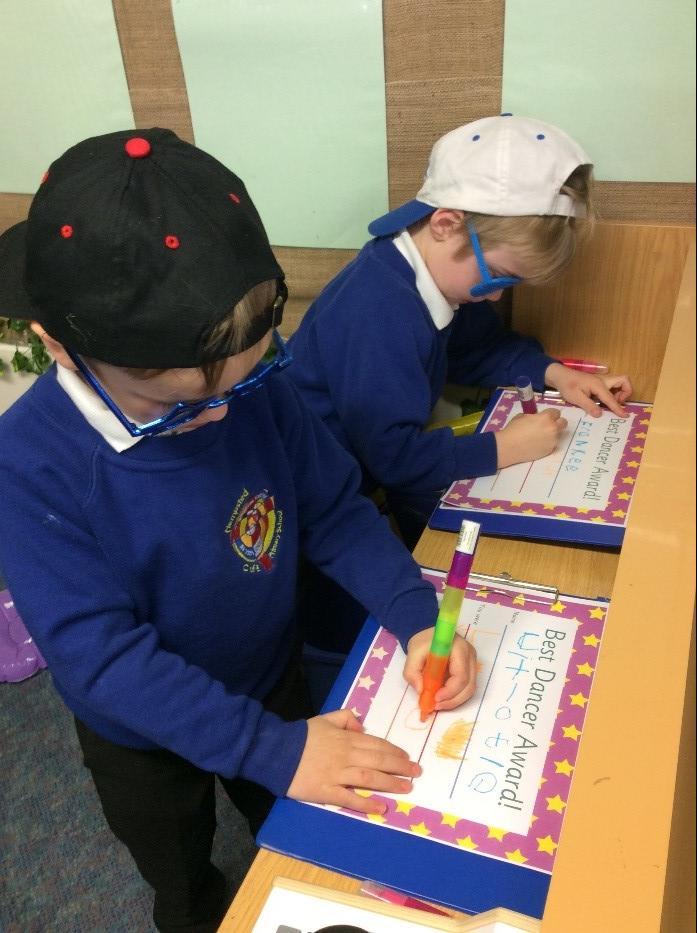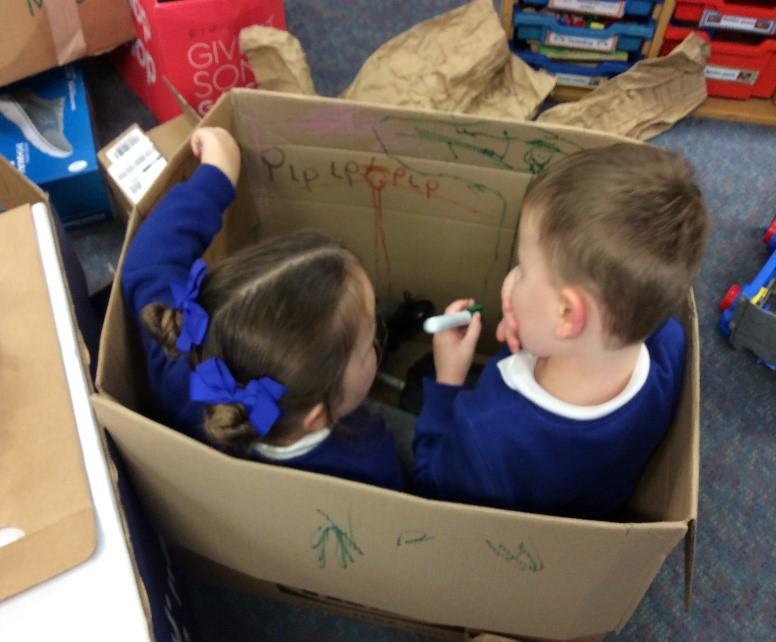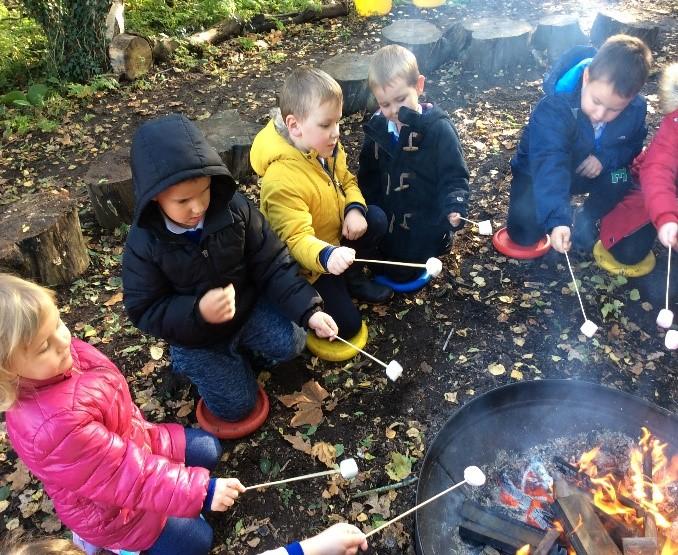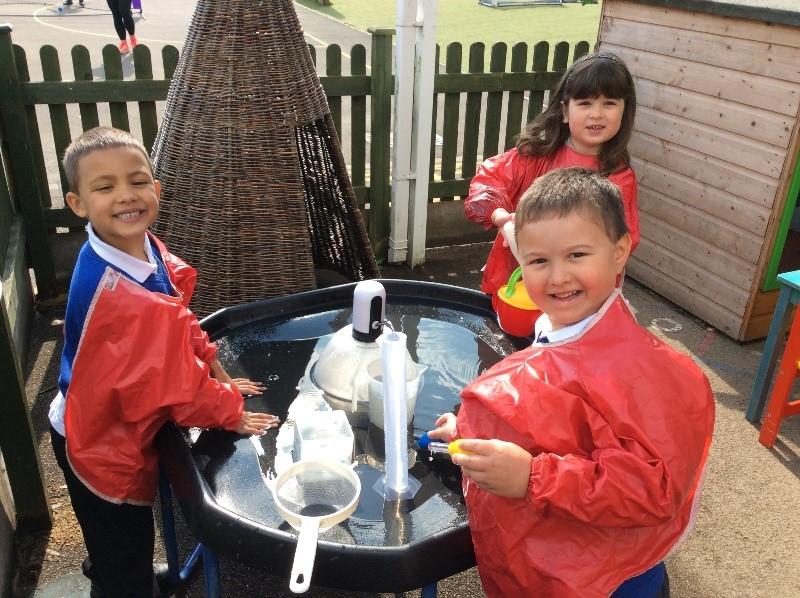The Early Years Foundation Stage (EYFS)
Our Curriculum Intent
Our curriculum is a balance between child-initiated and adult-led learning. It is designed to recognise children’s prior learning, both from previous settings and their experiences at home. We work in partnership with parents, carers and other settings to provide the best possible start at Hempsted C of E Primary School. Our ambition is that each child reaches their God-given potential from their individual starting points.
We have a strong emphasis on the Prime Areas of learning; Personal, Social and Emotional Development; Communication and Language; and physical development. A carefully planned continuous provision along with an enabling environment evolves to meet the needs of the children. We develop positive, trusting, respectful relationships with the children and good communication between school and home is a key to this success.
We provide an engaging curriculum that maximises opportunities for meaningful cross-curricular links, as well as promoting the unique child by offering extended periods of play and sustained thinking. We follow children’s interests and ideas to foster a lifelong love of learning both in and outside of school. Additionally, we provide a wide range of learning experiences that seek to broaden the cultural capital of each child and raise ambition.
We see everything as an opportunity to learn. We want each child to be happy, feel secure and to be engaged in their learning. We want them to grow socially, develop their independence and to learn to take risks in a safe environment.
By the end of the Reception year, our intent is to ensure that all children make at least good progress from their starting points and are equipped with the skills and knowledge to have a smooth transition into Year 1.
Our Curriculum Implementation - How we teach in the EYFS
Our curriculum follows the Early Years Statutory Framework for the Early years Foundation Stage. This document specifies the requirements for learning and development in the EYFS and provides the prime and specific areas of learning we must cover in our curriculum.
We introduce a new theme each half-term to provide inspiration for learning, whilst providing the flexibility for children to follow their own interests and ideas. Children learn through a balance of child-initiated and adult-directed activities. We take advantage of cross curricular links in order to combine transferable skills and develop a wide-ranging vocabulary which underpins the children’s learning. Each year creates its own unique blend of whole class, guided, adult directed play and child-initiated play activities dependant on the nature and needs of the class of individuals.
Our short term planning aims to give children opportunities to practise, apply and embed their learning in a range of different ways. The timetable changes throughout the year to take into consideration the changing needs of the children. These sessions are followed by small focused group work. This means the teacher can systematically check for understanding, identify and respond to misconceptions quickly and provide real-time verbal feedback which results in a strong impact on the acquisition of new learning.
Literacy including phonics
It is crucial that children develop a love of Reading and the desire to read. Our aim is to encourage a love of reading right from the start by exposing children to a range of books that not only develop a love of reading, but have been chosen specifically to develop their oracy, vocabulary and comprehension skills. We have a storytime everyday which is a special and enjoyable time when we read both fiction and non-fiction books to the children.
The EYFS is print-rich where it is meaningful for the children and where it has significance for them. Within continuous provision books are available in multiple areas of the classroom, including outside, that children can access independently.
In addition to this our Reception Reading Spine has been developed and we have six key texts that we focus on during the year to complement our curriculum.
Favourite books are revisited during the year. Through this, children begin to internalise new vocabulary, language patterns and begin to retell stories.
We follow the DfE’s Essential Letters and Sounds programme to ensure consistency across the school.
Children begin the Autumn Term in Reception on Phase 2, and subsequently Phase 3 where they will develop GPC and segmenting and blending skills to decode words. During the Summer term, children move on to Phase 4 and 5. Oral blending and segmenting play a vital role for the duration of the Reception year.
Within continuous provision, developmentally appropriate phonics resources are available to compliment, reinforce and extend the children’s learning, alongside high quality, meaningful interactions from adults. Misconceptions are addressed as and when they arise.
Children are encouraged to read at home and are listened to regularly in school. Term 1 begins with books that match their phonic knowledge in order for them to apply their learning with the aim of becoming successful, confident and fluent readers. The books also help to develop the children’s language skills as well as the concept of how to use books. In addition to this, children choose a library book of their choice to take home that parents can read and enjoy with their children.
Phonics packs are sent home in Term 1 with a covering letter to explain to parents how to use the pack with useful tips on how to help their child, including directing them to the school website where they will find a short video demonstrating the correct pronunciation of sounds. The pack includes sound flashcards, a sound mat and termly Buzz Words (high frequency words, both decodable and tricky). We also hold a Phonics Evening for parents to share how we teach children to read and how they can support their child at home.
Mathematics
It is important that children develop a positive attitude and interest in Mathematics, that they are confident to ‘have a go' and not be afraid to make mistakes.
In Reception, we follow the White Rose Maths Scheme of work which is in line with the new statutory framework for EYFS 2021. Key mathematical concepts are revisited and developed across the year.
The scheme is divided into ten phases and provides a variety of opportunities to develop the concepts of number, shape and measure.
Pupils learn through games and tasks using concrete manipulatives and pictorial structures and representations which are then rehearsed applied and recorded within their own child-led exploration. Numberblocks is also used to compliment the White Rose Maths Scheme when appropriate.
Within continuous provision, developmentally appropriate maths resources are available to compliment, reinforce and extend the children’s learning, alongside high quality, meaningful interactions from adults which support children in developing mathematical thinking and discussion. Misconceptions are addressed as and when they arise.
Wider Curriculum
Our wider curriculum is taught through the learning areas; ‘Understanding of the World’ and ‘Expressive Arts and Design.’ EYFS staff have a good understanding of how ELG’s feed into the National Curriculum and colleagues/subject leaders throughout the school are also aware of the key ELG’s that link to each foundation subject and the progression of the subject.
Exciting, purposeful and contextual activities are planned to build on children’s natural curiosity. For example, building a house for their favourite teddy, going for a walk as ‘autumn’ detectives, bringing in family photographs and hunting for minibeasts. Subject specific vocabulary is modelled and encouraged by staff.
Our inclusive approach means that all children learn together, but we have a range of additional intervention and support for children who may not be reaching their potential, or are showing a greater depth of understanding and need further challenge. This includes, for example, sessions for developing speech and language, social skills, fine motor skills, phonics, and mathematics.
Children with My Plans and EHCP’s have bespoke plans – some have identified that learning may need to take place away from the classroom due to sensory needs.
SLT and the EYFS staff regularly monitor teaching and learning as well as undertake CPD specific to Early Years to develop our practice. We share an excellent understanding of where pupils are, and their ‘next steps,’ for learning.
How do we know if our curriculum is working?
Baseline: Prior to children starting, staff spend time speaking to the child’s parents, previous settings and read previous learning journey’s to gain an understanding of the whole child and where they are at. During the first half term in Reception, all staff use ongoing assessments, observations and conversations with the child to develop a baseline assessment. This identifies each individual’s starting points in all areas so we can plan experiences to ensure progress. The following baseline assessments are also carried out:
The RBA (Statutory Reception Baseline Assessment) This assessment focuses on ‘Language, Communication and Literacy,’ and ‘Mathematics.’ The purpose of this is to show the progress children make from Reception until the end of KS2.
NELI (Nuffield Early Language Intervention) NELI is an evidence-based oral language intervention for children who show weakness in their oral language skills and who are therefore at risk of experiencing difficulty with reading. The assessment informs us if the child is at the expected level for their age or requires intervention from a trained NELI practitioner.
Ongoing Observation: All ongoing observations are used to inform weekly planning and identify children’s next steps. This formative assessment does not involve prolonged periods of time away from the children and excessive paper work. Practitioners draw on their knowledge of the child and their own expert professional judgements through discussions with other practitioners, and using a range of evidence such as conversations with a child and physical evidence such as a drawing. Parents are also invited to contribute evidence of achievement through WOW vouchers.
Assessment: Phonic assessments are carried out every half term to quickly identify pupils that are not making expected progress. Our aim is for children to ‘keep up’ rather than ‘catch up’ where possible.
Continuous assessments in other areas of the curriculum are recorded on class assessment sheets and fed into the class progress folder. We hold two parent/teacher consultation events each year to discuss a child’s attainment and progress. In Summer Term 2, the EYFSP is completed where the teacher assess whether the child has met each of the 17 ELG’s. They will be assessed as either ‘emerging’ or ‘expected.’ Whilst there is no judgement to state if a child is exceeding beyond an ELG, this information is shared by teachers as part of the written report to the child’s parents in the Summer Term. This narrative is also shared with the Year 1 teacher.
